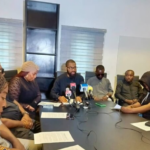As cancer ravages Nigeria’s children, Daily Trust on Sunday looks at the non-communicable disease yearning for attention.
Fatima, 5, battled an eye ailment for five months before it was diagnosed as retinoblastoma at the National Eye Care Hospital in Kaduna.
Her father, Mohammed, said when it started, she was taken to a nearby patent medicine store. Medicines were prescribed and bought. But soon after her right eye started bulging, discharging pus and oozing.
Daily Trust published a story to raise funds for Fatima, who was the 14th child of her father. The story drew sympathy from an individual who offered to cover her medical expenses in 2017.
Three weeks after the offer, she died – another statistic added to Nigeria’s under-five mortality index.
Four-year-old Benjamin was in and out of hospital since birth for surgeries to remove a tumour over his anus. He lived in constant pain and discomfort, shared only by mother who stayed by his hospital cot, nursing him day and night. He died last December.
Three year-old Abijia was hospitalized for months at the National Hospital Abuja. To begin his treatment, doctors presented his mother Mercy with an initial down payment of N100,000. She absconded with her son.
Initially, she refused to take calls even when she was told the money had been raised. Her fear was, she would be caught and punished for absconding if she showed up to take it. Currently, calls put to her number no longer connect. It is difficult to ascertain Ajibia’s current fate.
A research ‘Challenge of paediatric oncology in Africa,’ led by LG Hadley, estimates nine in 10 children with cancer live in developing countries and in low-income countries with limited access to healthcare. Survival rates for childhood cancer ranged from 10 to 20%.
Hadley’s research also observed late presentation for many tumours like nephroblastoma in Nigeria, where 72% were stages III and IV or BL stages III and IV were observed in 40% and 30%, respectively.
Dr Hafsat Ahmad, a paediatric oncologist and haematologist at the Ahmadu Bello University Teaching Hospital, Zaria, who led an eight-year research on pattern and outcomes of childhood malignancies at ABUTH, said, 247 of the 426 childhood cancer cases between January 2006 and December 2013, were children under five years.
The research said retinoblastoma had the highest frequency with 147 cases representing 34.5%, followed by Burkitt lymphoma (cancer that starts in the immune cells called B-cells) with 67 cases (15.7%) and acute leukaemia with 52 cases (12.2%).
It said surgery and chemotherapy were the most common modalities of treatment offered to about 80% of the cases with 137 cases giving a mortality rate of 32.2% among the cancer cases and 2.5% overall from the paediatric wards of the hospital.
“While 14 (5.8%) children were formally discharged, almost half of the total cases 224 (52.6%) abandoned treatment while 48 (11.4%) absconded or left against medical advice. While seven to eight of every 10 children with cancer are cured in resource-rich settings, more than 70% of all cancer-related deaths occur in resource-poor settings. More than 80% of children with cancer have little or no access to treatment even though childhood cancers are often treatable,” it revealed.
In the last one week in Nigeria, following the World Cancer Day on February 4, there have been various cancer awareness programmes and projects.
“But they have all arguably focused on adults and if any has focused on childhood cancer, it most likely did not receive the same attention or buzz as a breast cancer or prostate cancer programme did,” an Abuja resident Ishaya Umar, said.
According to islamic-relief.org, nearly 450 million children live in Africa. Yet, in the entire continent, there are only four specialist children’s hospitals – compared to about 20 in the UK.
A Twitter poll conducted by our reporter revealed that only 33.3% of respondents had sufficient knowledge about childhood cancers.
Speaking on the causes of childhood cancers, Ahmad said, they are generally unknown, “but there are certain things that predispose a child to cancer such as genetics which may be inherited or not. There are other things like infection. Malaria has been implicated in the development of childhood cancer – Burkitt’s lymphoma.
“There is also another virus which has been implicated in the development of so many childhood cancers like lymphoma with HIV infection. Also, children of mothers who underwent radiation while pregnant are also at risk of having cancer.”
While there is a rise in some of the childhood cancers like leukaemia, there is only about one paediatric oncologist for every 40 children with cancer, says Ahmad.
Ascertaining the survival rate for affected children is difficult. After an initial contact with the Cancer Registry, Abuja and our reporter sent an email stating her requests for information on childhood cancer as the staff had advised, there were no responses to calls or further messages. Also, the online request form was filled for the same purpose. Only an email confirming receipt came back.
Ahmad however said, for those in hospital, survival is very low. “I don’t have definite data to back it up but from what I have seen, I would say it is less than two percent. If I give you examples from my Centre here at ABUTH which is a Centre of Excellence for Oncology, mortality is about 32 percent,” she said, attributing funding, ignorance, late and wrong diagnosis as some of the reasons fuelling the mortality rate.
Adding: “They would have gone to traditional healers, prayer houses, primary health centres, general hospitals and private clinics and at this time, it would have affected different parts of the body. By the time they come to us, they would have exhausted all their finances. Our patients make out of pocket payments. Some of the diagnosis facilities are unavailable. Those available are expensive. Diagnosis could take up to two weeks. By the time they come, the cancer has advanced, is infected, malnourished and anaemic.
“These have to be first addressed to strengthen the child for treatment. There is bed space payment, feeding and medicines which are not only expensive but also difficult to find. All these take a toll on the patient. That’s why many abscond or leave against doctor’s advice.”
A visit to the National Hospital’s paediatric ward which houses children with cancer, gave some insight on facilities.
What could be described as a general ward comprises six beds in two sizes – the longer for 12-year-olds and above and the smaller ones for 11-year-old and below. Each bed ought to be kitted with functional oxygen masks, tubing and light. But two beds had light which weren’t working. When a child in either of those beds was to be treated, the personnel used torch light from their phones or moved the child to a bed where the light worked. There were animations on the wall in bright colours which contrasted nicely with the severity of the children’s illnesses.
Speaking with Daily Trust on Sunday, Celestine Ogbudeke Business Development Officer of Clearline, a Health Management Organisation, said cancer patients-whether adults or children-are only covered up to N5million in insurance for treatment but only for platinum subscribers who didn’t have cancer before subscribing.
Runcie Chidebe, psychologist, cancer control advocate and the executive director of Project Pink Blue, an organization which has since 2013 advocated cancer control and care, said, “There is a need for government at all levels to prioritise cancer care and treatment. Health financing and budget is very low in Nigeria. Currently, no state in Nigeria has a cancer control plan, the Federal Ministry of Health has just developed a cancer plan but it requires funding for implementation.
“For Nigeria’s population, eight cancer centres where only three or four machines work, are insufficient. Nigerians shouldn’t be travelling to Ghana, Kenya, South Africa for radiotherapy. Nigerians pay about $6,000 for radiotherapy in Kenya.
“It would be extremely significant if cancer screenings are in public health centres and general hospitals. This way, we can detect cancers very early and prognosis would be clearly better. “
It is difficult to determine what proportion of children never get medical help, but field experience shows the reality is only a tip of the iceberg.
Fatima, Benjamin and Ajibia are only part of the 200,000 children diagnosed yearly with cancer globally.
While research shows advocacy and awareness might have helped, Nigeria could also learn from Finland, the leading country in cancer care and research.
This story was supported by Code for Africa.



